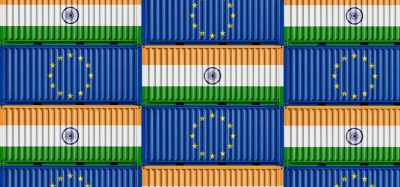Unlocking intellectual property potential in European pharma
Posted: 6 February 2025 | Joshua Harris (Burford Capital) | No comments yet
Joshua Harris, Director, Burford Capital, discusses how patent monetisation, including systems like the Unified Patent Court (UPC), enables European pharmaceutical companies to remain competitive and ensure R&D investment and innovation.


Bringing groundbreaking drugs and therapies to market is critical for the European pharmaceutical industry, yet these businesses face significant hurdles. Intellectual property (IP) management and monetisation is essential to overcoming these challenges, and the introduction of the Unified Patent Court (UPC) offers a centralised system that enhances intellectual property protection, helping companies sustain innovation and maintain a competitive edge.
Innovation in European pharma
Innovation requires investment. In the European pharma sector, delivering groundbreaking new drugs or therapies to market requires significant financial investment to overcome the “translation gap” from research to commercial launch. To ensure that they have the substantial resources that these processes demand, pharma companies must strategically manage their intellectual property to secure financial returns and maintain a competitive edge. Patents play a critical role by providing innovators with time-limited exclusivity, incentivising further innovation and investment.
Impact of the Unified Patent Court
The introduction of the UPC provides a centralised system for enforcement of European patents (including the new unitary patents) across Member States, significantly impacting how pharma companies approach intellectual property strategy and protection and offering them an additional lever in funding ongoing innovation.
The UPC is a single court system designed to handle European patent disputes and offers numerous benefits for patent holders. One of its key advantages is the ability to bring infringement actions in a centralised system, eliminating the need for fragmented litigation across multiple jurisdictions.
Historically, differences in national patent and court systems across States led to variations in litigation timelines and outcomes, increasing not only complexity and risk but also litigation and enforcement costs. The UPC streamlines the process, enabling pharma companies to obtain injunctions and calculate damages more efficiently.
The [Unified Patent Court] offers a simplified and cost-effective approach to protecting [intellectual property, leading to the opportunity to] significantly accelerate product launches and provide greater financial certainty”
The UPC offers a simplified and cost-effective approach to protecting intellectual property during the critical commercialisation phase. The ability to secure a single ruling across multiple jurisdictions can significantly accelerate product launches and provide greater financial certainty.
With coverage spanning multiple countries and millions of consumers, damages awards in UPC judgments are expected to be larger compared to previous fragmented litigation approaches. Early cases also indicate that the UPC offers faster proceedings compared to US courts, featuring shorter response times and quicker hearings, altogether making it a claimant-friendly environment.
Monetising pharma intellectual property assets
In the pharma sector, businesses face tight timelines to maximise returns on their R&D investments, and significant financial stakes. Different monetisation avenues require different timescales and capital to pursue. European pharmaceutical firms are increasingly turning to patent monetisation strategies to generate liquidity and fuel further development. Of the methods European pharma businesses can use to monetise patents, the two most frequently used are direct enforcement (licensing and/or litigation) and indirect enforcement (strategic divestiture).
Direct enforcement
Direct enforcement involves leveraging patents to generate revenue through licensing or litigation to enforce patent rights. This strategy allows businesses to retain ownership of their patent assets while actively protecting and monetising them.
• Licensing: Pharmaceutical firms can generate revenue by licensing their patented drugs and technologies to strategic partners, creating new income streams while retaining control over their intellectual property assets.
• Litigation: When competitors use patented inventions without authorisation, enforcement through litigation becomes necessary. By offering a single venue for cross-border disputes, the UPC reduces legal complexity, expedites case resolution, and enhances the enforceability of judgments.
Case study: helping a European biotech company protect its patents
A European biotech company focused on discovering new therapies and methods for treating cancer found initial scientific and regulatory success. Commercially, success was limited.
To remedy this, the startup approached a large US-based pharmaceutical company with international reach, with the intention of partnering on therapies using the biotech’s patents. The large pharmaceutical company rejected the opportunity to work with the smaller European biotech and instead sought to invalidate the biotech’s European patents while launching its own product worldwide.
The European biotech company recognised the only way that billions of dollars’ worth of the large pharmaceutical company’s therapies could be sold was by infringing the biotech’s patents. Capital was needed to pursue a patent infringement suit so that the smaller European biotech could be compensated.


Our firm provided support by funding counsel’s discounted fees and costs for patent infringement litigation in the US. This investment allowed the European biotech to enforce its patent rights in the US, protect its technology and continue to pursue its own vital ongoing clinical research and development as the case progressed.
A jury found the large pharmaceutical company guilty of willfully infringing the European biotech company’s patents, rejected all validity challenges and awarded millions of dollars in damages.
From this successful trial, the European biotech has had its intellectual property rights verified and now has an asset in the judgment. While the infringer seeks to overturn the decision, the success is a strong indicator of the merits of the European biotech’s claim and may allow the European biotech company to generate liquidity in the near term.
Indirect enforcement
Indirect enforcement involves divesting patents to a third party for immediate revenue or cost savings. This strategy is particularly favoured by larger pharma businesses with substantial patent portfolios.
Divestiture
Selling non-core patents provides immediate financial relief by reducing maintenance costs and generating upfront revenue. Legal finance supports this process by facilitating transactions, evaluating monetisation potential and providing working capital to buyers, ensuring seamless and efficient divestiture.
The role of legal finance in patent monetisation
Legal finance helps companies navigate the financial challenges inherent in high-risk R&D and unlock the full value of their intellectual property assets while maintaining their innovation cycles by:
• Defending intellectual property through litigation: Legal finance reduces the financial burden of enforcing patents against infringers. For small biotech startups, protecting a core patent can be existential, and legal finance ensures they can pursue justice without jeopardising their operations.
• Generating liquidity from intellectual property assets: By monetising underutilised or non-core IP, legal finance creates immediate revenue streams that companies can redirect toward advancing R&D or scaling operations
• Reducing financial risks: Legal finance offloads litigation risks, allowing companies to focus on their innovation pipelines while preserving capital for strategic growth and continued R&D investment.
Conclusion
By unlocking the value of their IP assets, businesses can continue to invest in R&D, bring life-saving drugs and therapies to market and navigate the complex challenges of the patent lifecycle”
Effective management and monetisation of intellectual property assets is critical to sustaining innovation and long-term success for European pharma businesses, benefiting patients and society at large. Legal finance provides the tools and resources necessary to protect and monetise IP, whether through direct enforcement or divestitures.
By unlocking the value of their intellectual property assets, businesses can continue to invest in R&D, bring life-saving drugs and therapies to market and navigate the complex challenges of the patent lifecycle. In a sector where the development timelines are long, the costs are high and the stakes are nothing less than life and death, legal finance ensures that the cycle of innovation remains unbroken.
About the author











